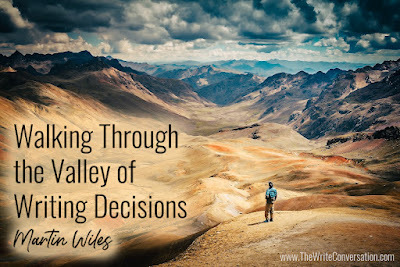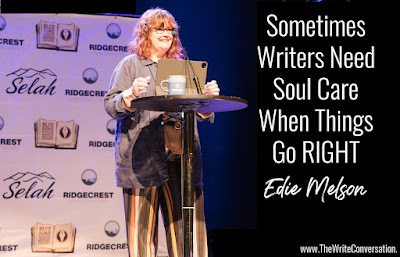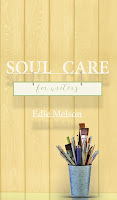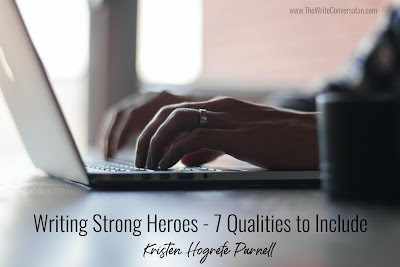Edie Melson's Blog, page 86
June 13, 2023
Marketing Yourself as a Ghostwriter and Important Elements of a Ghostwriting Contract

by Linda Gilden @LindaGilden
This month we are going to finish our series on ghostwriting by discussing two things: 1) How to market yourself as a ghostwriter and 2) The important elements of a ghostwriting contract.
How to Market Yourself as a Ghostwriter
Let’s start with how to market yourself as a ghost. Marketing yourself in not always easy, especially if you are not an extrovert. You will eventually have to talk to others about yourself and your new ghostwriting endeavor. However, you will find many ways to market yourself even if you are an extreme introvert. As you will discover, many things can be done without even interacting with others while you build your confidence.
Word of mouth is still one of the best marketing plans. Those who read your book, especially those you have ghostwritten and get excited about them, will tell their friends. Give a copy to your family and friends and ask them to write reviews as well as tell others that you are also a ghostwriter. Sometime it feels like we are giving away lots of books. But rarely have I regretted giving one to someone who has a need and someone who will tell their friends about it. Your name does not always appear on the front of the book so you may need to take a minute to explain that to friends and family.
Many people post readily on social media even though they have never have met the people on the other end of their posts. But announcing ghostwriting as a new element of your career will help you get the word out. Social media allows you to use photos of you opening the box of books and the excitement on your face. Giving a copy to your friend have a good friend to take a picture of pulling your book out of a gift bag. Make sure he or she identifies it is a ghostwritten book in their post. If you have grandchildren, dress them up really cute and have them gather around your book. Maybe even have a few of them jumping up and down.
Find blogs that share the same message as the book you are ghosting and inquire about being a guest blogger. You could repeat that with many different blogs. Just be sure to be able to meet the deadlines. You may decide to organize this as a blog tour and blog for a different blog each week. If possible. Offer a “freebie” as an additional incentive to become interested in your book and your new ghostwriting segment.
When you add ghostwriter to your website, be sure to use SEO (Search Engine Optimization) to drive your website higher in rank on Google. If you don’t know how to do this, there are experts you can hire to do a website evaluation.
Writing articles is an excellent way to get your name out about your ghostwriting. In your bio always be sure to include the word ghostwriter. Bios aren’t long but if you are trying to begin a ghostwriting career, make sure ghostwriter is one of your key words.
Important Elements of a Ghostwriting Contract
Any agreement you make with another writer such as co-writing, ghostwriting, editing, article writing, or whatever should be accompanied by a written contract. Many co-authors feel like they are really good friends but a contract has nothing to do with friendship but everything to do with business. When you have it in writing, there will be no questions twenty years later about the elements of your original conversation.
Here are a few things you want to be sure to include:
1. The date when you entered into the agreement.
2. Who the author and who the ghostwriter is. Along with stating that, it might be a good time for both the author and the ghostwriter to discuss whether or not the ghostwriter’s name will be on the cover or if a confidentiality clause is necessary for the contract.
3. The method you will use to get this book or story written. In other words, will you meet regularly so you will understand how to organize the story. Will you exchange information by email? Will it all be done by phone communication? If you don’t know your subject well, it is always a good idea to get together at least a few times.
4. A statement of the fees of the ghostwriter and how to be paid. Sometimes ghostwriters are paid a flat fee as a work made for hire. Then they receive no further compensation. Occasionally the author and ghostwriter will share the royalties depending on an already agreed upon split.
5. The deadline to complete the manuscript. You may want to break this down into phases for each section of the project.
6. The author agrees that any material he or she gives to the ghostwriter is his own material and not copied from anywhere else.
7. If the author withdraws from the project, the ghostwriter is entitled to a kill fee as determined by the author and ghostwriter.
8. What happens to royalties if one author dies, quits writing, or is unable to finish the project? Usually it is divided between the remaining heirs of the one who is unable to finish and the remaining author.
There will be other things you want to include after a conversion between the author and the ghostwriter. Once you have that conversation with your author, you should be able to “fill in the blanks” with other things you would like to include.
Now that you have enough information to get started, get to your computer and look for your first client. Or work on your bios and add ghostwriter in the appropriate places. If you have other questions, please put them in the chat and I will get back to you as soon as possible.
For now, happy ghostwriting to all our readers!
TWEETABLEMarketing Yourself as a Ghostwriter and Important Elements of a Ghostwriting Contract, @LindaGilden on @EdieMelson (Click to Tweet)
Don't Miss the Other Posts in this Series!
WHAT IS GHOSTWRITING AND HOW TO GET STARTED (PART 1)
HOW TO GET STARTED IN GHOSTWRITING (PART 2) MARKETING YOURSELF AS A GHOSTWRITER AND IMPORTANT ELEMENTS OF A GHOSTWRITING CONTRACT
 Linda Gilden has coauthored 11 books with 5 different coauthors, with #12 and #13 debuting in 2022, adding a new co-author to the list. She loves every one of her coauthors and enjoys collaborating on interesting projects with them. She also has written many books on her own and realizes what a treasure and blessing a good co-author is.
Linda Gilden has coauthored 11 books with 5 different coauthors, with #12 and #13 debuting in 2022, adding a new co-author to the list. She loves every one of her coauthors and enjoys collaborating on interesting projects with them. She also has written many books on her own and realizes what a treasure and blessing a good co-author is.
Published on June 13, 2023 22:00
June 12, 2023
Friendship—One of the Best Benefits of Attending a Writing Conference

by Cindy K. Sproles @CindyDevoted
Friendship can be the most unlikely thing. Don't you think? To me, friendship is a place, not a person. It's a gift—a tiny box filled with personalities that, once opened, warms my heart, makes me feel special, and teaches us about faithfulness. Not just faithfulness to one another but to the God who created us.
As a writer, my somewhat reclusive life leads me to times and places that only my mind can conjure. It's easy to become best friends with the characters I invent—after all, they are my characters. They're everything I would imagine my best friends to be (or not). I've assigned them the perfect set of attributes.
I travel to numerous conferences in the spring and summer, sometimes logging 15,000 plus miles in a season. Though the travel itself wears at me, the excitement of visiting with my writer friends far exceeds the dread of another flight.
My writer friends fill me. They're like giant extension cords that plug into me and recharge me. We laugh, cry, and rejoice in one another. We celebrate our wins and losses and pick one another up when we fail. We are friends. You may ask, those are all traits of people, not places, but I differ. At this conference, I met with a publisher friend who has been more of an acquaintance until we met at the coffee shop. We began to laugh, talk, and find out we were both kicked out of Bible Study Fellowship. Since we've emailed, I believe a new relationship has begun. A lasting friendship. One where we can help one another.
The writers I call my friends meet me in a place where the regular world cannot enter. They meet me in my heart, join me in a soulful relationship, and understand me when all others can't. Here in this "place," I find others who "get" me. They come to play in my imaginary world and bounce off the " what if's" that could happen in my stories. These friends are unique and special.
And when the day comes that the conference ends and I have to say goodbye, I mourn them.
When you travel to a writer's conference, you'll meet people, develop friendships, and network. The obvious result of a conference is the learning, but when you walk away—short of that learning—you get out of it what you put into it. If you've secluded yourself away, then you've missed the primary point of the conference—the friends and peers.
When you forge friendships at a conference, you develop a network of peers who can help you grow in your writing. They will be your support system and connect you to others—they will rejoice with you when you sign that first agent. Those people will help you market when that first book releases, not because they feel obligated, but because they have invested in YOU.
Of course, you learn writing skills from the professionals. You'll get the trends and the newest tricks of the trade. Learn. Study. Find your way in the writing world. Talk to friends and professionals and further your career but do not leave a conference without a handful of business cards—those cards hold the email addresses of your new friendships. Develop those. Meet them in the places where the average folks cannot go, and while you are there, rejoice in them. These are Christian friends; when we meet, pray, and worship together, we quickly see that God is with us through these friendships. You'll see God is for us, and He is in us. All of that is well worth your invested money, and the payout is amazing. I look forward to seeing you again very soon.
TWEETABLEFriendship—One of the Best Benefits of Attending a Writing Conference, advice from author @CindyDevoted on @EdieMelson (Click to Tweet)
 Cindy K. Sproles is an author, speaker, and conference teacher. Having served for a number of years as a managing editor for Lighthouse Publishing of the Carolinas and Ironstream Media, Cindy now works as a mentor, coach, and freelance editor. She is the co-founder of Writing Right Author Mentoring Services with Lori Marett and she is the director of the Asheville Christian Writers Conference. Cindy is also the co-founder of Christian Devotions Ministries and WWW.CHRISTIANDEVOTIONS.US, as well as WWW.INSPIREAFIRE.COM. Her devotions are in newspapers and magazines nationwide, and her novels have become award-winning best-selling works. She is a popular speaker at conferences and a natural encourager. Cindy is a mountain girl, born and raised in the Appalachian mountains, where she and her husband still reside. She has raised four sons and now resorts to raising chickens where the pecking order is easier to manage. You can visit Cindy at WWW.CINDYSPROLES.COM or www.wramsforwriters.com.
Cindy K. Sproles is an author, speaker, and conference teacher. Having served for a number of years as a managing editor for Lighthouse Publishing of the Carolinas and Ironstream Media, Cindy now works as a mentor, coach, and freelance editor. She is the co-founder of Writing Right Author Mentoring Services with Lori Marett and she is the director of the Asheville Christian Writers Conference. Cindy is also the co-founder of Christian Devotions Ministries and WWW.CHRISTIANDEVOTIONS.US, as well as WWW.INSPIREAFIRE.COM. Her devotions are in newspapers and magazines nationwide, and her novels have become award-winning best-selling works. She is a popular speaker at conferences and a natural encourager. Cindy is a mountain girl, born and raised in the Appalachian mountains, where she and her husband still reside. She has raised four sons and now resorts to raising chickens where the pecking order is easier to manage. You can visit Cindy at WWW.CINDYSPROLES.COM or www.wramsforwriters.com.Featured Image: Photo by Alexis Brown on Unsplash
Published on June 12, 2023 22:00
June 11, 2023
Develop a Prewriting Routine and Make Your Writing Productivity Soar
Edie here. I'm over-the-moon excited to have one of my publishing heroes as one of our monthly contributors. I've known Larry Leech for longer than he or I wants to admit to and he's an absolute gold mine of publishing wisdom, encouragement and information. Please give him a warm TWC welcome!!!

By Larry Leech @LarryJLeechII
I love golf. I love playing while enjoying a few hours of fresh air. I love watching. The Golf Channel is on one of our TVs pretty much every minute of every waking moment in our house, even now while I write this blog. I love thinking about my stance, my takeaway, my downswing. You name it, a thought about any part of the golf swing or a golf course probably crosses my mind once or twice or a dozen times a day.
A few years ago while I watched the first round of the U.S. Open, a thought popped into my head. Scary, I know. I watched golfer after golfer that day go through a pre-shot routine. Stand behind ball and look where they want to hit it. Take a few practices swings. Stand over the ball. Maybe take a few more practices swing. Stand over the ball. Wiggled. Steady their feet. Look down the fairway or across the putting green. Boom. Then hit.
Which got me thinking. Scary again, I know. How can their meticulous preparation help me with my writing?
Their pre-shot routine helps with muscle memory and focus. Both things we need when we write.
I have found that a pre-writing routine has helped get me into the right frame of mind. Pre-pandemic my routine was pretty simple: setup my laptop in the same spot at my branch office, order the same drink every time, place my drink in the same location near my mouse, set my screen at the same angle, find a concert video on YouTube, and put in my ear buds. Each action helped the writing gears in my mind click into place. Muscle memory.
Despite sitting in a sometimes insanely busy coffeeshop, I kept my attention on the task at hand. Focus. Another regular said to me one day, “I didn’t want to bother you yesterday when I was in. I could tell by the look on your face that you were focused.”
Did I need to go through all that to write? Maybe, maybe not. But it has worked for me.
The routine, obviously, has changed somewhat with many of the branch offices not open yet for indoor seating. But hopefully soon. I miss my old routine.
And like routines vary from golfer to golfer, routines will vary from writer to writer. If you haven’t tried a pre-writing routine, give it a shot. You might discover that you are more productive with one.
TWEETABLEDevelop a Prewriting Routine and Make Your Writing Productivity Soar from @LarryJLeechII on @EdieMelson (Click to Tweet)
 Writing coach of award-winning novelists, Larry J. Leech II has spent nearly 40 years working with words. After a 23-year journalism career that began in 1981, Larry moved into freelance writing and editing in 2004. He has ghostwritten nearly 30 books and edited more than 250 manuscripts. Larry teaches at numerous conferences nationwide and can be found online on Twitter, Facebook, Instagram, and his website, www.larryleech.com.
Writing coach of award-winning novelists, Larry J. Leech II has spent nearly 40 years working with words. After a 23-year journalism career that began in 1981, Larry moved into freelance writing and editing in 2004. He has ghostwritten nearly 30 books and edited more than 250 manuscripts. Larry teaches at numerous conferences nationwide and can be found online on Twitter, Facebook, Instagram, and his website, www.larryleech.com.
Featured Image: Photo by Clay Banks on Unsplash

By Larry Leech @LarryJLeechII
I love golf. I love playing while enjoying a few hours of fresh air. I love watching. The Golf Channel is on one of our TVs pretty much every minute of every waking moment in our house, even now while I write this blog. I love thinking about my stance, my takeaway, my downswing. You name it, a thought about any part of the golf swing or a golf course probably crosses my mind once or twice or a dozen times a day.
A few years ago while I watched the first round of the U.S. Open, a thought popped into my head. Scary, I know. I watched golfer after golfer that day go through a pre-shot routine. Stand behind ball and look where they want to hit it. Take a few practices swings. Stand over the ball. Maybe take a few more practices swing. Stand over the ball. Wiggled. Steady their feet. Look down the fairway or across the putting green. Boom. Then hit.
Which got me thinking. Scary again, I know. How can their meticulous preparation help me with my writing?
Their pre-shot routine helps with muscle memory and focus. Both things we need when we write.
I have found that a pre-writing routine has helped get me into the right frame of mind. Pre-pandemic my routine was pretty simple: setup my laptop in the same spot at my branch office, order the same drink every time, place my drink in the same location near my mouse, set my screen at the same angle, find a concert video on YouTube, and put in my ear buds. Each action helped the writing gears in my mind click into place. Muscle memory.
Despite sitting in a sometimes insanely busy coffeeshop, I kept my attention on the task at hand. Focus. Another regular said to me one day, “I didn’t want to bother you yesterday when I was in. I could tell by the look on your face that you were focused.”
Did I need to go through all that to write? Maybe, maybe not. But it has worked for me.
The routine, obviously, has changed somewhat with many of the branch offices not open yet for indoor seating. But hopefully soon. I miss my old routine.
And like routines vary from golfer to golfer, routines will vary from writer to writer. If you haven’t tried a pre-writing routine, give it a shot. You might discover that you are more productive with one.
TWEETABLEDevelop a Prewriting Routine and Make Your Writing Productivity Soar from @LarryJLeechII on @EdieMelson (Click to Tweet)
 Writing coach of award-winning novelists, Larry J. Leech II has spent nearly 40 years working with words. After a 23-year journalism career that began in 1981, Larry moved into freelance writing and editing in 2004. He has ghostwritten nearly 30 books and edited more than 250 manuscripts. Larry teaches at numerous conferences nationwide and can be found online on Twitter, Facebook, Instagram, and his website, www.larryleech.com.
Writing coach of award-winning novelists, Larry J. Leech II has spent nearly 40 years working with words. After a 23-year journalism career that began in 1981, Larry moved into freelance writing and editing in 2004. He has ghostwritten nearly 30 books and edited more than 250 manuscripts. Larry teaches at numerous conferences nationwide and can be found online on Twitter, Facebook, Instagram, and his website, www.larryleech.com.Featured Image: Photo by Clay Banks on Unsplash
Published on June 11, 2023 22:00
June 10, 2023
Walking Through the Valley of Writing Decisions

by Martin Wiles @LinesFromGod
Before one school year, the headmaster emailed, asking which teachers wanted an iPad. Since the school had already given us laptops—and I used this to portray information on the overhead—I didn’t see a need for an iPad and declined the offer.
My wife had owned an iPad for some time, having won one in a raffle. I used it occasionally, but most of my work required a keyboard and a word processing program—two things the iPad made inconvenient. Then one day, I broke down and bought an iPad Mini. I used it mainly to surf the Web—until it locked one day while I was at the hospital and became what techies call a “security block.”
Later in the school year, I decided I wanted an iPad. But I decided too late to get one, so I investigated buying one from our cell phone provider. Between the monthly cost and adding it to our data plan, we would pay an extra thirty dollars on our phone bill. No thanks. We had just paid off our phones.
Then, students began quarantining because of COVID, and we needed to record our class sessions. I needed an iPad, after all, and the school ordered more. I got my iPad, after all, free of charge.
Deciding not to purchase an iPad when I suddenly decided I wanted one might seem like a small decision in the realm of decision-making, but doing so entailed some of the same elements accompanying life’s more important choices.
Joel warned God’s people and those who weren’t about impending judgment because they had disobeyed or refused God: “Thousands upon thousands are waiting in the valley of decision” (Joel 3:14 NLT). Millions would find themselves walking the valley of decision and deciding whether they would turn to God.
But the spiritual realm isn’t the only life area where we must decide. We writers often have decisions coming at us like ants to cracker crumbs. And since our decisions usually bring a domino effect—some more so than others—praying before we make them is always wise—prayers not of the microwave variety.
Praying about whether to write shouldn’t be on our list. If God has called us, the answer is always “Yes.” But when we walk through the valley of decision about the genre, we should pray. Should we write fiction or nonfiction? And if fiction, what type? Historical, suspense, romance, mystery, sci-fi. And if nonfiction, what kind? Self-help articles, short stories, devotions, books (and what type of books).
I once thought I was less of a writer because I couldn’t easily produce fiction. I knew all the ins and outs and could teach them to students and other writers, but fiction didn’t come naturally to me. But then, I thought about two successful writer friends who don’t write fiction, one of whom proudly admitted she was a left-brain writer. I am, too.
God wires us differently, but matches our opportunities to our brains. So while stepping outside our comfort zones can stimulate creativity and sharpen our writing skills, we’ll do our best work when staying in the lane in which God created us to write.
We writers should also put aside what we want and want what God wants when walking through the valleys of writing decisions. We may crave a best-seller, a successful agent, a book contract, a traditional publisher, or a shelf spot at a famous bookstore. Pride, selfishness, and a competitive spirit can hinder us from making wise decisions.
God can grow us as we make writing decisions if we respond correctly in the valleys. Since our goal should be to follow God’s will and not ours, we should include Him in all our writing decisions—large and small. On what basis are you making your writing decisions?
TWEETABLEWalking Through the Valley of Writing Decisions from author Martin Wiles (@LinesFromGod) on @EdieMelson (Click to Tweet)
 Martin Wiles is the founder of Love Lines from God (WWW.LOVELINESFROMGOD.COM) and serves as Managing Editor for Christian Devotions and Directing Editor for VineWords. He has authored six books and has been published in numerous publications. His most recent book, DON'T JUST LIVE...REALLY LIVE, debuted in October of 2021. He is a freelance editor, English teacher, author, and pastor.
Martin Wiles is the founder of Love Lines from God (WWW.LOVELINESFROMGOD.COM) and serves as Managing Editor for Christian Devotions and Directing Editor for VineWords. He has authored six books and has been published in numerous publications. His most recent book, DON'T JUST LIVE...REALLY LIVE, debuted in October of 2021. He is a freelance editor, English teacher, author, and pastor.
Published on June 10, 2023 22:00
June 9, 2023
Writers, I Double-Dog-Dare You to Have Fun This Summer

by Beth K. Vogt @BethVogt
A few nights ago, I dusted off our long-ignored backgammon board my husband Rob and I’d received as newlyweds oh-so-many-years-ago.
Were we rusty? Yes. The game required a review of the rules and a search for an extra set of mismatched dice. Our game was more low-key than competitive, but that will change as time goes on.
The TV was turned off. Our laptops were shut. The To Dos were ignored.
It was a fun hour—and yes, Rob won. Give me a few more practice games, and things will get more intense.
What does backgammon have to do with writing, Beth? Maybe the heroine of my work-in-progress (WIP) will play backgammon.
More importantly, consider this blog post your official reminder to make time in your busy life to have some fun.
Summer begins on June 21. All too often as writers, we panic as we try to figure out how to keep writing when the kiddos are home during the summer months. Our schedule is upended and, instead of enjoying June, July, and August, we square off with the lazy, hazy days of summer.
Who will win? Our schedule or the lure of summer fun?
I vote you make time in your schedule for fun. Work and deadlines will always be there, my friends, but before you know it the Back-to-School sales will be crowding the store shelves.
Ideas for Summer Fun for Writers
Pull out some favorite games. Declare a weekly family and/or friends game night. Think classics like Uno or Racko or Clue or something newer like Code Names or Blurt or Moods.Gather s’mores supplies. Push pause on your word count and indulge in the quintessential taste of summer. It’s optional whether you eat dinner first or go straight for the graham crackers, chocolate, and marshmallows. Head to the beach. Walk along the shore or body surf or grab a board and ride the waves. It’s all about sun, sand, and salty water.Go ahead—ignore clock. Stay up late or sleep in late. Extra points if you doze in a hammock. Take the road less traveled. Go for a hike. Pick a new trail. Not necessarily a more difficult trail, just one you haven’t done before. Watch an outdoor movie. Take along your favorite childhood candy—a 3 Musketeers candy bar for me—and soda and popcorn. Stay until the credits roll.
What about you? What activity would you add to my list?
TWEETABLEA Double-Dog-Dare for Writers to Have Fun This Summer from author @BethVogt on @EdieMelson (Click to Tweet)
 Beth K. Vogt believes God’s best often waits behind the doors marked “Never.” She’s authored 14 novels and novellas, both romance and women’s fiction. Beth is a Christy Award winner, an ACFW Carol Award winner, and a RITA® finalist. Her novel Things I Never Told You, book one in her Thatcher Sisters Series by Tyndale House Publishers, won the 2109 AWSA Golden Scroll Award for Contemporary Novel of the Year. An established magazine writer and former editor of the leadership magazine for MOPS International, Beth blogs for Learn How to Write a Novel and The Write Conversation and also enjoys speaking to writers group and mentoring other writers. She lives in Colorado with her husband Rob, who has adjusted to discussing the lives of imaginary people. Connect with Beth at bethvogt.com.
Beth K. Vogt believes God’s best often waits behind the doors marked “Never.” She’s authored 14 novels and novellas, both romance and women’s fiction. Beth is a Christy Award winner, an ACFW Carol Award winner, and a RITA® finalist. Her novel Things I Never Told You, book one in her Thatcher Sisters Series by Tyndale House Publishers, won the 2109 AWSA Golden Scroll Award for Contemporary Novel of the Year. An established magazine writer and former editor of the leadership magazine for MOPS International, Beth blogs for Learn How to Write a Novel and The Write Conversation and also enjoys speaking to writers group and mentoring other writers. She lives in Colorado with her husband Rob, who has adjusted to discussing the lives of imaginary people. Connect with Beth at bethvogt.com.Featured Image: Photo by Alvan Nee on Unsplash
Published on June 09, 2023 22:00
June 8, 2023
Sometimes Writers Need Soul Care When Things Go RIGHT

by Edie Melson @EdieMelson
Yep, you read that title correctly.
Soul care isn’t just for times when life is difficult.
I’m recently back from one of the highlights of my writing year— The Blue Ridge Mountains Christian Writers Conference . For me, this is a spiritual high. It’s a time when:I’ve heard from God Gotten to witness what He’s doing in my life and in the lives of other writers And a time when I’ve been able to fellowship with other believers who are also writers.
I come back from this even like I do every year—overwhelmed, blessed, and absolutely exhausted.
As I said above, Soul Care isn’t just for times when life is difficult.
I’ve learned that exhaustion is exhaustion and even when it comes from a good source, it still means I have to take care of myself.
10 Things I Do to Care for My Writing Soul
1. I spend time in prayer and fellowship with God. Only God can renew my spiritual energy and only He can give me the right perspective on where to go from here.
2. I take some time doing other things I love to do. For me, that often involves my camera. The day after BRMCWC this year, I spent the day with my husband and best friend, DiAnn Mills and her husband Dean. We took a field trip to the Carl Sandburg home. My husband Kirk had several jokes about where writers go to rest, but we ignored him and had a marvelous time! And I took my camera and captures some fun images—inside the house of his workspace, typewriters and books—as well as pics of his garden and ground. It was a day that ministered to my creative heart.
3. I get extra rest. I’m not someone who likes to nap. I take pride in being an early-to-rise-and-early-to-bed sort of girl. But after this event, I’m tired and I need to set aside my pride and build in some extra sleep time to allow my body—and my mind—to recover.
4. I don’t give in to the guilt. Coming home from a trip means coming back to a mountain of a to-do list. But to do those things well will take some time. I didn’t get behind in a single day and I won’t get caught up in a single day.
5. I spend time with friends, especially friends who understand my writing gift. It helps me process when I share the highs and the challenges with someone I trust.
6. I wait to make important decisions. When I’m exhausted, I’ve found that I don’t think clearly. I need time to recuperate before I sign any contracts or make any life-altering career choices.
7. I acknowledge that after a high comes a low. It’s a natural progression. It’s not always fun, but when I know to expect a low, it’s much easier to deal with and it doesn’t derail my writing journey. Instead I accept it’s part of the process and I know “this too shall pass.”
8. I go outside and stay active. No this isn’t a contradiction to #3. My body needs healthy activity as much as it needs rest. Plus spending time in the sunlight has physical as well as mental benefits. I’m not running a marathon (I’m actually not running at all) but short walks help me reorient myself to normal life.
9. I watch what I eat. I’ve learned that when I’m exhausted, I tend to gravitate toward comfort foods. Too much of these foods, which for me are high in empty calories and starches, make me lethargic, depressed and fat. I indulge carefully and with an eye toward renewing my energy, not prolonging my exhaustion.
10. I read and write in my journal. One of things I urge writers to do during a conference is to write down the good stuff that happens. The reason is that when we get home and the lows come, we often don’t believe or second-guess the good things people have said and the God moments we’ve had. When the doubts creep in, I go back and read what I recorded and it gives me hope.
NOTE: So what if you didn’t record the good stuff that happened? It’s not too late. Take it to the Lord in prayer and ask Him to bring to your mind the ways He’s worked and the things others have said about your writing. Here are FOUR verses to remind you of the truth that God will answer you:Proverbs 8:17Deuteronomy 4:29Luke 11:9 – 10 Jeremiah 29:13
As long as we live on this earth, writers will need soul care. We must plug into the unending source of creativity if we want to continue and not burn out.
Now it’s your turn, how do you find Soul Care after a good thing has left you exhausted? Be sure to share your thoughts in the comments section below.
Don’t forget to join the conversation!Blessings, Edie
TWEETABLESometimes Writers Need Soul Care When Things Go RIGHT from author and conference director, @EdieMelson (Click to Tweet)

If you’re interested in my Soul Care for Writers , check out my book from Bold Vision Books, Inc. It’s available on Amazon Barnes & Noble Bold Vision Books
 Edie Melson is a woman of faith with ink-stained fingers observing life through her camera lens. She’s a writer who feels lost without that device & an unexpected speaker who loves to encourage an audience. She also embraces the ultimate contradiction of being an organized creative. She knows the necessity of Soul Care and leads retreats, conferences & workshops around the world on staying connected to God. Her numerous books, including the award-winning Soul Cares eries & reflect her passion to help others develop the strength of their God-given gifts. Her blog, The Write Conversation is recognized as one of the top 101 industry resources.
Edie Melson is a woman of faith with ink-stained fingers observing life through her camera lens. She’s a writer who feels lost without that device & an unexpected speaker who loves to encourage an audience. She also embraces the ultimate contradiction of being an organized creative. She knows the necessity of Soul Care and leads retreats, conferences & workshops around the world on staying connected to God. Her numerous books, including the award-winning Soul Cares eries & reflect her passion to help others develop the strength of their God-given gifts. Her blog, The Write Conversation is recognized as one of the top 101 industry resources. She and husband Kirk have been married 40+ years and raised three sons. They live in the foothills of the Blue Ridge Mountains and can often be found hiking—with Edie clinging to the edge of a precipice for the perfect camera angle and Kirk patiently carrying her camera bag and tripod. Connect with her on her website, www.EdieMelson.com and through social media.
Published on June 08, 2023 22:00
June 7, 2023
What to Do With All Those Business Cards After a Writing Conference

by Julie Lavender @JLavenderWrites
A large number of us creatives just returned from the Blue Ridge Mountains Christian Writers Conference. We brought much home with us—memories to treasure of sweet fellowship with those that truly get us, wisdom and knowledge gleaned from classes and keynotes, and dreams of published words dancing in our hearts.
If you’re like me, you also brought home a collection of business cards from new friends and updated ones from previously-met friends. Before you absentmindedly file those away with good intentions, spend time completing these seven steps with each card to maximize the friendship and support attached to each small rectangle. Take care to follow all the steps with each individual card before moving on to another one.
Oh, and I hope you remembered to jot down on the back of each card the circumstances surrounding how the two of you met. Did you meet in a continuing class? Afternoon workshop? Did you share a meal together? If you didn’t do this at the conference, write down as much as you remember now on the back of each card to help you retain the meeting memory. It’s especially fun if you write down their preferred writing genre so you can ask pertinent questions later.
Okay, here’s the steps I suggest to keep in touch with new and not-so-new friends following a conference, using business cards you collected.
Things to Do with Business Cards from a Writing Conference
1. Follow on social media
Look for your conference friend on Facebook (check for an author page as well as a personal one), Instagram, Twitter, TikTok, LinkedIn, or any other favorite social media site you frequent. Like and follow, then comment on the last post so that the site recognizes your engagement. It will help your new friend’s posts come across your feed more readily that way.
2. Visit website
Check out your new friend’s website. Share their website on your social media with a direct link to get to the website.
3. Subscribe to newsletter
Find the link to subscribe to your writer friend’s newsletter. Be sure to verify that you subscribed, which typically is as simple as clicking one link in an email you’ll receive.
4. Share blog
If your new friend is a blogger, read their last blog post. Be sure to make an engaging, sincere comment about the blog post. Then share their blog post to your sites as well.
5. Look for published books.
Explore the writer’s website to find books they’ve published or Google their name on Amazon. Consider adding a book to your wish list or order your favorite right away to add to your “to be read” pile!
6. Place reminders on calendar to stay in touch
On a paper calendar (or on your phone’s calendar), flip forward a couple of months and jot down your friend’s name. When that calendar day rolls around, shoot off an email message of encouragement to your friend or stop by their social media pages to ask what’s going on in their writing journey. Offer encouragement and Bible verses and ask if they have any special prayer requests.
7. Pray regularly
Add the new friend’s name to your prayer journal and remember to pray often for him or her by name. Pray for personal requests and writing dreams, too.
Once you’ve completed the tasks for all of the cards you brought home, store them safely in an envelope labeled BRMCWC 2023 (or whatever conference you’ve just attended) and refer to the cards if you need to in the future.
Have fun encouraging and supporting your fellow creatives, until you meet again at another event. Join the conversation by sharing ideas and tips you’ve put into place to stay in touch with conference friends.
TWEETABLEWhat to Do With All Those Business Cards After a Writing Conference - @JLavenderWrites on @EdieMelson (Click to Tweet)
 Author and journalist Julie Lavender loved catching up with old friends and meeting new ones at Blue Ridge Mountains Christian Writers Conference. She believes writing conferences give writers super-powers to persist on the writing journey. She is the author of Children’s Bible Stories for Bedtime (Penguin Random House), 365 Ways to Love Your Child: Turning Little Moments into Lasting Memories (Revell/Baker), a forthcoming mom’s devotional from Penguin Random House, and two picture books from End Game Press and its imprint.
Author and journalist Julie Lavender loved catching up with old friends and meeting new ones at Blue Ridge Mountains Christian Writers Conference. She believes writing conferences give writers super-powers to persist on the writing journey. She is the author of Children’s Bible Stories for Bedtime (Penguin Random House), 365 Ways to Love Your Child: Turning Little Moments into Lasting Memories (Revell/Baker), a forthcoming mom’s devotional from Penguin Random House, and two picture books from End Game Press and its imprint.
Published on June 07, 2023 22:00
June 6, 2023
How to Develop the Characters You Write into Well-rounded People

by Sarah Sally Hamer @SarahSallyHamer
What's in Your Character's Wallet?
You’ve probably seen that credit card commercial where a celebrity looks straight into the camera and implies that, if you don’t have a certain card in your wallet, you’re somehow missing out.
But think of it another way—what exactly does your wallet/purse have in it? Why? And what does it say about you?
Creating characters, deep, complex, well-rounded characters, can be accomplished in many ways, but one of my favorites is to show what they keep nearest to them. Even though the male persuasion-type may not carry a purse, they can stuff a lot of very personal items into a small space. So, let’s play with some options!
1. Pictures
Nowadays, we mostly keep our pictures on our phones but in my grandfather’s day, he carried a picture of my grandmother from when they first met. I only saw it once because he wasn’t an emotional man—short on words, long on silence—but I think it spoke volumes as to how much he really loved her.
Even if it’s on a cell phone, whose picture would be first? A spouse? A child or children? Maybe a place that means a lot? We can more easily see these things on someone’s social media now but I think that a Facebook photo takes away some of the intimacy. What photos would your protagonist keep close?
And what would that mean to him or her? Would that character look at the photo in an emotional time? Why? For comfort? For courage? For nostalgia?
2. Letters/papers
I still have the letter where my late husband first told me he loved me. I don’t carry it in my wallet—it’s much too precious—and it means the world to me. What items would your character want to save? Maybe she’s on the run and can only keep the most treasured items safe. Maybe his child was kidnapped and the only thing he has left is a picture his boy drew. How would these characters FEEL when they saw the letter/drawing in their wallet/purse? Would it make them happy? Or very, very sad?
3. Money
Even how much money a person carries can tell you a lot about them. My father-in-law always had a pocket full of bills wrapped in a rubber band. It was mostly ones, but I’ve seen him riffle through the wad and pull out a couple of larger denominations. He also tucked at least one hundred-dollar bill in his wallet. Quickly available cash was very important to him. On the other hand, I rarely carry cash. Not because I don’t have enough but because I just don’t pay much attention to it. It doesn’t matter because there’s always that blue card or a nearby bank where I can get cash if I need it.
What would that say about a character? One with cash in their wallet probably would be very well prepared for any emergency but one with limited ways of purchasing things may not be. How could that situation play out in a scene, especially if one needs cash and the other won’t give it to her, even though she knows he has it?
4. Personal items
Of course, a purse has a lot more room in it than the average wallet. But what type of personal items would your character need? And what would that item tell you, and your reader?
Some women carry makeup for instance, or at least a lipstick. But maybe a different character wouldn’t have any at all.
So, let’s put this to the test. Pretend you’re sitting across the table from your character and ask them to empty their purse, wallet, and pockets out. You can ask for their cell phone too, since the videos they’ve been watching can also tell you a lot. Sort through everything in your mind. What’s there? And why?
What if her purse is only a tiny crossover bag just big enough for an iPad and a couple of tissues and maybe a wallet for the id and credit cards? What if his wallet is thick enough to cause him back pain? What would they have “on top” where they could reach it easily and what would they have tucked away in the most private place possible? And why?
Ultimately, you’ll probably not use much, if any, of the items in your story. But how much fascinating information can you glean from such a simple exercise?
What’s in YOUR character’s wallet?
TWEETABLEHow to Develop the Characters You Write into Well-rounded People from @SarahSallyHamer on @EdieMelson (Click to Tweet)
 Sarah (Sally) Hamer, B.S., MLA, is a lover of books, a teacher of writers, and a believer in a good story. Most of all, she is eternally fascinated by people and how they 'tick'. She’s passionate about helping people tell their own stories, whether through fiction or through memoir. Writing in many genres—mystery, science fiction, fantasy, romance, medieval history, non-fiction—she has won awards at both local and national levels, including two Golden Heart finals.
Sarah (Sally) Hamer, B.S., MLA, is a lover of books, a teacher of writers, and a believer in a good story. Most of all, she is eternally fascinated by people and how they 'tick'. She’s passionate about helping people tell their own stories, whether through fiction or through memoir. Writing in many genres—mystery, science fiction, fantasy, romance, medieval history, non-fiction—she has won awards at both local and national levels, including two Golden Heart finals.A teacher of memoir, beginning and advanced creative fiction writing, and screenwriting at Louisiana State University in Shreveport for over twenty years, she also teaches online for Margie Lawson at www.margielawson.com. Sally is a free-lance editor and book coach at Touch Not the Cat Books, with many of her students and clients becoming successful, award-winning authors. You can find her at hamerse@bellsouth.net or www.sallyhamer.blogspot.com
Published on June 06, 2023 22:00
June 5, 2023
How To Keep the Dialog You Write Fresh

by PeggySue Wells @PeggySueWells
There is an art to writing dialog that takes place between multiple characters, yet the topic remains the same. Different conversations, same subject matter. How can you discuss a person, incident, or event multiple times without repeating facts?
Once your reader already knows something, resist being tedious by repeating that same information. When another character must be informed of the news already revealed, share the information in a way that does not repeat what the reader knows does give the reader new information
For instance, in Chasing Sunrise the reader knows from a previous chapter that Michael has been on an assignment that went sideways. To keep from boring the reader into a coma, and to increase suspense, each time this incident is spoken about, characters must talk about it with fresh information.
Michael barged into his commanding officer’s office. Corbin waved him to a chair, but Michael walked straight to the large desk and tossed his parajumper insignia across the dark wood surface. “You used me.”
Corbin calmly regarded Michael. “I heard there was an incident on your last assignment.”
“I didn’t become one of America’s fighting elite to kill women.”
“My information was sketchy, Michael. We were ordered to protect the patient.”
Michael waved a hand at the television on a low coffee table. Though presently muted, the screen showed Bennett Taylor wiping his eye. “The patient was a general’s wife who was mysteriously hospitalized.”
“Don’t you watch the news? Taylor’s a senator now.” Corbin crossed the room and closed the office door. “A general’s wife or a senator’s wife should receive extra protection.”
“Mr. God-and-Country barred all visitors and ordered life support withheld. That’s not protection. It’s a death sentence.”
Corbin returned to his desk. “But you did apprehend someone who was making an attempt on the patient.”
“I apprehended her father, Corbin. Her father was attempting to give water to his only child.”
Corbin indicated the chair again. “Sit down, Northington.”
“No.”
“I’ll look into things, Michael.”
“Don’t bother. She died.”
“Take some time off.” Corbin picked up the insignia and held it out for Michael. “Cool down.” The metal flash in Corbin’s hand was the image of an angel enfolding the world in its wings.
“I’m done.” Michael turned and walked away. He had his hand on the doorknob when Corbin spoke again.
“Did you know her?”
Michael stopped, pausing before he answered. “Yeah, I knew her.”
Of course, there also has to be a conversation about what is going to happen next with Michael’s partner. How can the writer provide fresh insights about the same topic to the person closest to our protagonist and the one who was there when it all happened?
Bryce casually slung an arm across the back of his chair and looked pointedly toward the discarded want ads. “So, battle buddy, what’s the plan?”
“I’m making this up as I go.”
“This from the guy who was on a fast track to his goals when he was still in diapers.” Bryce signaled the waitress and turned his attention back to Michael. “You were prepubescent when you joined the Civil Air Patrol.”
“I was fourteen and you weren’t.”
“Being the older, more mature member of this dynamic duo, I was sixteen.” Bryce folded his sunglasses into his shirt pocket. “And driving myself to meetings while your mom dropped you off in that stylish station wagon.”
Remembering, Michael smirked. “You were driving that rust-fringed, dilapidated pick-up truck older than Methuselah.”
“Don’t poke fun at that ride, Mikey,” Bryce warned. “It got us to a lot of great places.”
“Training weekends, ground team practice, survival school, flight school…”
“You made it through the toughest training regimen in the world.” Bryce leaned forward on the table. “Parajumper is all you’ve wanted to be since you were sixteen. It’s what you’ve been for ten years.”
Studying his mug, Michael nodded.
“Come back, partner.”
Michael spun his glass in slow circles, the condensation leaving wet rings on the table. “I can’t.”
Bryce sighed. “This is about the general’s wife.”
“What’s our prime directive, Bryce?”
“So that others may live.”
“Two people have done something for me in my life.” Michael met his gaze. “One of them was Verity. They used me to kill her. I can’t work for people like that.”
When writing dialog, avoid repeating facts the reader already knows. Instead, consider how you can drip fresh information into each conversation.
TWEETABLEHow To Keep the Dialog You Write Fresh from author @PeggySueWells on @EdieMelson (Click to Tweet)
Don't Miss the Other Posts in This Series
Writing Dialog Worth Quoting Dialogue or Dialog How to Keep the Dialog You Write Fresh
 Tropical island votary and history buff, PeggySue Wells parasails, skydives, snorkels, scuba dives, and has taken (but not passed) pilot training. Writing from the 100-Acre Wood in Indiana, Wells is the bestselling author of thirty books including The Slave Across the Street, Slavery in the Land of the Free, Bonding With Your Child Through Boundaries, Homeless for the Holidays, Chasing Sunrise, and The Ten Best Decisions A Single Mom Can Make. Founder of SingleMomCircle.com, PeggySue is named for the Buddy Holly song with the great drumbeat. At school author visits, she teaches students the secrets to writing and speaks at events and conferences. Connect with her at www.PeggySueWells.com, on Facebook at PeggySue Wells, and LinkedIn at linkedin.com/in/peggysuewells
Tropical island votary and history buff, PeggySue Wells parasails, skydives, snorkels, scuba dives, and has taken (but not passed) pilot training. Writing from the 100-Acre Wood in Indiana, Wells is the bestselling author of thirty books including The Slave Across the Street, Slavery in the Land of the Free, Bonding With Your Child Through Boundaries, Homeless for the Holidays, Chasing Sunrise, and The Ten Best Decisions A Single Mom Can Make. Founder of SingleMomCircle.com, PeggySue is named for the Buddy Holly song with the great drumbeat. At school author visits, she teaches students the secrets to writing and speaks at events and conferences. Connect with her at www.PeggySueWells.com, on Facebook at PeggySue Wells, and LinkedIn at linkedin.com/in/peggysuewellsFeatured Image: Photo by Christina @ wocintechchat.com on Unsplash
Published on June 05, 2023 22:00
June 4, 2023
Writing Strong Heroes - 7 Qualities to Include

By Kristen Hogrefe Parnell @khogrefeparnell
Gilbert Blythe. Mr. Knightly. Mr. Darcy. Doc MacNeill.
That is the short list of strong male heroes who wove themselves into my heart as a teenage reader.
Gilbert Blythe may have called Anne “carrots,” but he did so to get her attention. He was a teasing schoolboy, but he grew to genuinely care about our favorite red-headed heroine.
Mr. Knightly. Where to begin? He was hard on Emma because he loved her, a truth she didn’t realize until much too late.
Mr. Darcy will forever be remembered for his flaw of pride but also for his loyal friendship and generosity that he would never speak of himself.
Doc MacNeill drove me crazy the first time I read Christy, but by the third or fourth reading, he had won me over. He was brave enough to move past his brokenness to love again.
These characters are all different, but they all have one thing in common: They are strong male characters.
And the world needs more of them. We writers must write them.
In honor of Father’s Day this month, let’s recognize seven qualities of strong male characters that matter more than ever in today’s world.
7 Qualities to Include in the Heroes You Write
#1: Flawed but forgiven
There are no such things as “perfect” men. (Same goes for us ladies!) But our flaws make us relatable and become the foundation for future strength we can share with others. Let’s write relatable heroes who show us how to move past failures and how to both extend and receive forgiveness.
#2: Stronger for their weakness
Often, a physical limitation or some other “thorn” they must overcome gives our male characters depth and an opportunity to showcase strength. We Christian fiction writers know that the Source of that strength comes from outside ourselves.
#3: Faith over fear
Whether our male heroes discover faith throughout the story or begin with a faith foundation, they can show us how to choose faith instead of fear.
#4: Sacrificial, not selfish
Does our hero put others before himself—even at great cost? Now there is a model our world needs!
#5: Broken but not beaten
Maybe others broke him. Maybe life circumstances have bruised him. But our hero won’t stay down, and he’ll model how to get back up again.
#6: Masculine, not feminine
In today’s world, masculinity is no longer applauded. However, it should be. Hard pass on anything effeminate. Our heroes know how to be men. Show me the cowboys, green berets, pastors who stand on God’s Word, policemen, firefighters, brave fathers, loyal husbands, and rugged outdoorsmen.
#7: Lost but now loved
Perhaps the most loved character I’ve written to date is a man named Gath. A slave turned cruel Gage enforcer, his journey to faith and his sacrifices along the way show how God can take a lost man and make him beloved.
Who is your favorite fictional hero, and what quality draws you to him so much?
TWEETABLEWriting Strong Heroes - 7 Qualities to Include, tips from author @KHogrefeParnell on @EdieMelson (Click to Tweet)
 Kristen Hogrefe Parnell writes suspenseful fiction from a faith perspective for women and young adults. Her own suspense story involved waiting on God into her thirties to meet her husband, and she desires to keep embracing God’s plan for her life when it’s not what she expects. Kristen’s books have won the Selah Award and the Grace Award, among others, and her inspirational romantic suspense novel, Take My Hand, is now available. An educator at heart, she also teaches English online, enjoys being a podcast guest, and blogs about biblical encouragement for mamas. Kristen lives in the Tampa, Florida area with her husband and baby boy. Connect with her at KristenHogrefeParnell.com.
Kristen Hogrefe Parnell writes suspenseful fiction from a faith perspective for women and young adults. Her own suspense story involved waiting on God into her thirties to meet her husband, and she desires to keep embracing God’s plan for her life when it’s not what she expects. Kristen’s books have won the Selah Award and the Grace Award, among others, and her inspirational romantic suspense novel, Take My Hand, is now available. An educator at heart, she also teaches English online, enjoys being a podcast guest, and blogs about biblical encouragement for mamas. Kristen lives in the Tampa, Florida area with her husband and baby boy. Connect with her at KristenHogrefeParnell.com.Featured Image: Photo by Thomas Lefebvre on Unsplash
Published on June 04, 2023 22:00



